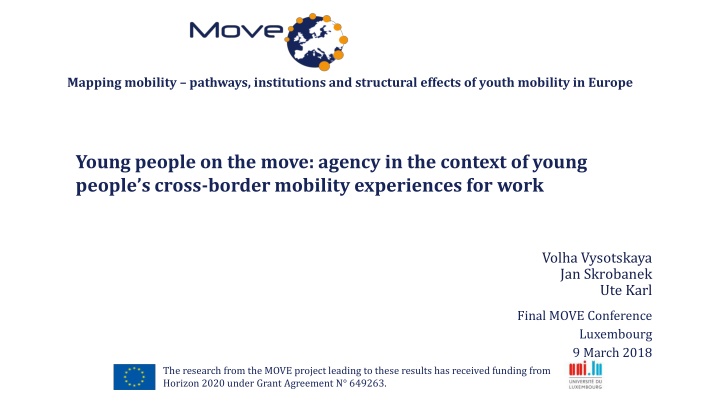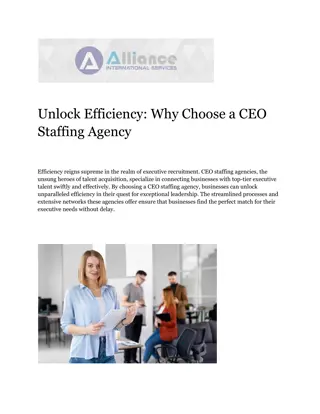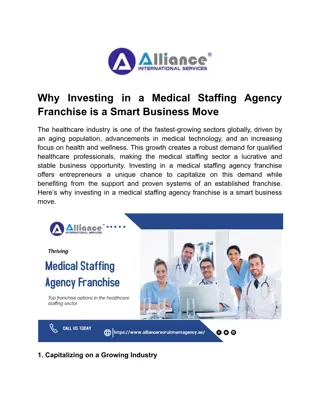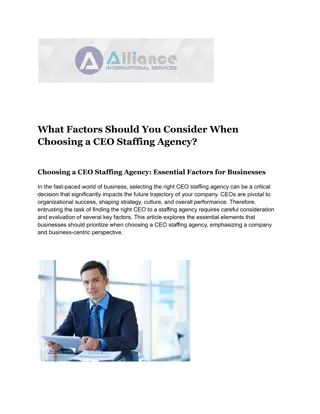Young people on the move: agency in the context of young
This research examines the pathways, institutions, and structural impacts of youth mobility in Europe, focusing on young people's cross-border experiences for work. The MOVE project investigates agency within these contexts, uncovering insights into the mobility patterns and outcomes of young individuals. The study, funded by Horizon 2020, sheds light on the dynamics of youth mobility and its broader implications.
Download Presentation

Please find below an Image/Link to download the presentation.
The content on the website is provided AS IS for your information and personal use only. It may not be sold, licensed, or shared on other websites without obtaining consent from the author.If you encounter any issues during the download, it is possible that the publisher has removed the file from their server.
You are allowed to download the files provided on this website for personal or commercial use, subject to the condition that they are used lawfully. All files are the property of their respective owners.
The content on the website is provided AS IS for your information and personal use only. It may not be sold, licensed, or shared on other websites without obtaining consent from the author.
E N D
Presentation Transcript
Mapping mobility pathways, institutions and structural effects of youth mobility in Europe Young people on the move: agency in the context of young people s cross-border mobility experiences for work Volha Vysotskaya Jan Skrobanek Ute Karl Final MOVE Conference Luxembourg 9 March 2018 The research from the MOVE project leading to these results has received funding from Horizon 2020 under Grant Agreement N 649263.
State of art: Agency Bourdieu Giddens Emirbayer and Mische capture notions of free will, choice and volitional action agency is always with structure agency is in everything emphasis on temporal dimension 3 changing agentic orientations of agency A and S are linked differently agency in habitus all persons have the agency is only conscious understanding of a person s perception of the situation structure and agency are conceptualised as mutually constitutive to make a difference , to exercise of power link A/S is romantic ( Collins (1992) iterational dimension (based on habits and schemas ) projective towards the future, imagination practical-evaluative dimension -possibilities of the actual situation , judgement capacity of agency to actively make the social world agency is dominated by structure and the embodiment of the habitus agency as social and relational since agency centres around the engagement by actors of the different contextual components that constitute their own structured yet flexible social universes (Emirbayer and Mische 1998, 973) do not show how A/S are interrelated
Point of departure to understand mobility by including temporal dimension in mobility: three dimensions of habit, imagination, and judgement (HIJ) temporal-relational contexts support particular agentic orientations (Emirbayer and Mische 1998, 1004) different patterns of the interlacement of habit, imagination, judgement, and a concrete (historical) situation can be identified in situations of mobility Research aim elaborate on the possibilities to practically reconstruct agency within migration studies by analysing how young people speak retrospectively about the process of moving abroad for work- and employment-related purposes
Data and Methods Grounded theory Agency as a sensitising concept Reconstruction of the the interlacement of habit, imagination, and judgement in and with a concrete (historical) situation Employment mobility Young people between 18 and 29 years old Various skills, male, female, mostly single 3 cases from the data corpus: 3 different patterns of the interlacement of agentic orientations Nika from Iceland Greta from Greece Nicolas from Luxembourg
Case 1: Nika Challenges in going on with the habitualised while imagining a better future no previous mobility habitual development caused by the emergence of a mobility option habit habitual orientations: security, economic wellbeing, When I was going home from work, and I was paid I called my husband and said now we have to go. It was very little paid, so it is not easy (in Iceland), it is very expensive, you cannot save money to buy a house or apartment and the salary is not good and wealth Then I started to think about how we can make the life easier for our children, better salaries, try to do new things optimistic of future through mobility open to future and positive outcome imagination Future is linked with habitual orientations regarding her and her family s socio-economic (in)security Norway] gives me the feeling to think about the future I thought it will be easier in Norway, I suppose to get to the places we want to be faster, we can save up money here, and we can maybe build the house, this is his [husband] dream mobility frame: negative view on her chances vs. connection between her own situational interpretation and a collective imagination of the situation judgement an attractive alternative elsewhere So, I called him [her husband] and said we had to move In Iceland, we always think about the future, we were nervous about everything, what will happen, is this going to be fine, but now we have started to learn a bit more just take one day in time and then see how it goes
Case 1: Nicolas Why not be mobile? Living in the present and being open to opportunities coming to your life mobility as routine, curiosity driven habitual orientations: flexibility, independence, mobility decision to look for other opportunities that fit his habitual practices of being mobile habit Yes, I was looking [for a job] but that was difficult here in Luxembourg, also because I went back to live with my parents, and now I have been living alone for so long. So... after seven years of living alone, going back to your parents place is not like the best thing for you to happen if you like living a little bit more free Absolutely, I would absolutely call it transition year, [that year] for me was coming back from University, looking for a job, couldn't find one, being back with my parents. So when the opportunity came to go to [town A in Germany] I was like OK, I will be living by myself again (00:07:25) staying open to future no fixed priorities imagination No job at home vs. doing uncommon mobility open towards the social environment and enjoying the life opportunities 95% of the people I know of my friends live in Luxembourg...I , I am the only one who is living abroad, and, friends are calling me: when are you coming back, when are you coming back, you know? I was not really uhm, looking for it but when it came, I, because I was not opposed to it, I was like: Why not? mobility driven by opportunity, rather than of structural constraints cultural capital gained and gained mobility experience allow him to adapt to anywhere judgement getting my first job in a really nice town, there was nothing that, that could have kept me at that moment. I had no girlfriend I never had like really problems to adapt to a place So, I was used to that and, I mean in terms of culture yes there are some differences, but it is not like going to, I don't know, China or going to Africa. It is still European, so it is not like, really being in a very different world, you know? Of course, it is different but it is not like, you cannot adapt
Case 1: Greta Step by step towards realising life objectives in mobility socio economic situation vs. determines to come to the UK decision to look for other opportunities that fit his habitual practices of being mobile habit habitual orientations: flexibility, independence, mobility No, the thing is, I mean, the way things are in Greece right now, everybody is looking around, and depending on the languages you speak, ...you're a bit limited if you don't go for England, then your next option are international countries I think that for Greek people, what makes sense, is to move to [city A in the UK] because most people do a Master in [city A in the UK], the next step is to find somewhere to work there and stay, and due to language barriers of course you're more comfortably moving in present mobility phase is imagined from the viewpoint of her future , ( UK) habitual and judgement orientation towards the move to Luxembourg is strongly rooted in her projection on the UK. Her current mobility phase is temporary imagination In, in [city A in the UK], you're one of a million. There the demand is quite high, so you might ... be able to find something, but it's gonna be ... very ... entry, entry level, so you will start by distributing coffees, and eh we already had some experience in Greece, so it was just easier to go, it's the second-best choice, because you can come through, eh with English. Any other destination would be more difficult Again, I ... will think at my first eh initial thought, but, I say that I have [city A in the UK] in mind, but that's like eh five, six, seven year, plan when I moved here, I, I felt like it was for more than eh, a year. but eh one year later, I feel happy with myself, you did a year professional life to her own present situation, her age, her capabilities in the country of origin vs. open-minded towards future due to an unfamiliar environment in the new destination linking social environment to her personal character judgement I was really straightened in the office, and and I heard a colleague was actually moving to Luxembourg and I started saying to myself, like, why don't you do it? Why don't you even try, I mean this is how it is here, it's not gonna change, so you need to make a change, and this is I knew that I won't make the change a lot of times so I thought, that if I don't do it now, I will, I will do it more reluctantly, at 30, so if it fails, it's okay I can always go back or find something else, but eh for now, it felt good
Analysis Case 1. Nika Challenges in going on with the habitualised while imagining a better future Case 2. Nikolas Why not be mobile? Living in the present and being open to opportunities coming to your life flexibility and adaptability Case 3. Greta Step by step towards realising life objectives in mobility habit security orientation determination and planning imagination aspirations and hope for the future in the new country determination for plan realisation why not keeping open and flexible judgement strong evaluation of the environment adjustment environment to own objectives opportunity over constraints
Discussion Analysis shows: Interlacement of habit, imagination, and judgement in a particular (historical) situation in which the young live Nicolas: looser impact of situational constraints Nika: tight impact of situational constraints Greta: possible ways of interlacing agentic orientations and their change through the mobility process Some conclusions of agency through temporal dimensions Young people base the habitual, imaginative and judgemental dimensions of agentic orientations in the socio-economic conditions Young take other aspects of the opportunity structures into consideration (lifestyle opportunities) Some young permanently oscillate between their agentic actions, situational constraints Others appear more flexible, experimental, or enfranchised to manoeuvre Hence: continuum of action from a stronger link to structural constraints to a more situational- individualised perception interlacement of habit, imagination, judgement in a concrete (historical) situation for, during or after mobility argument demonstrates the empirical fruitfulness of the concept of Emirbayer and Mische























